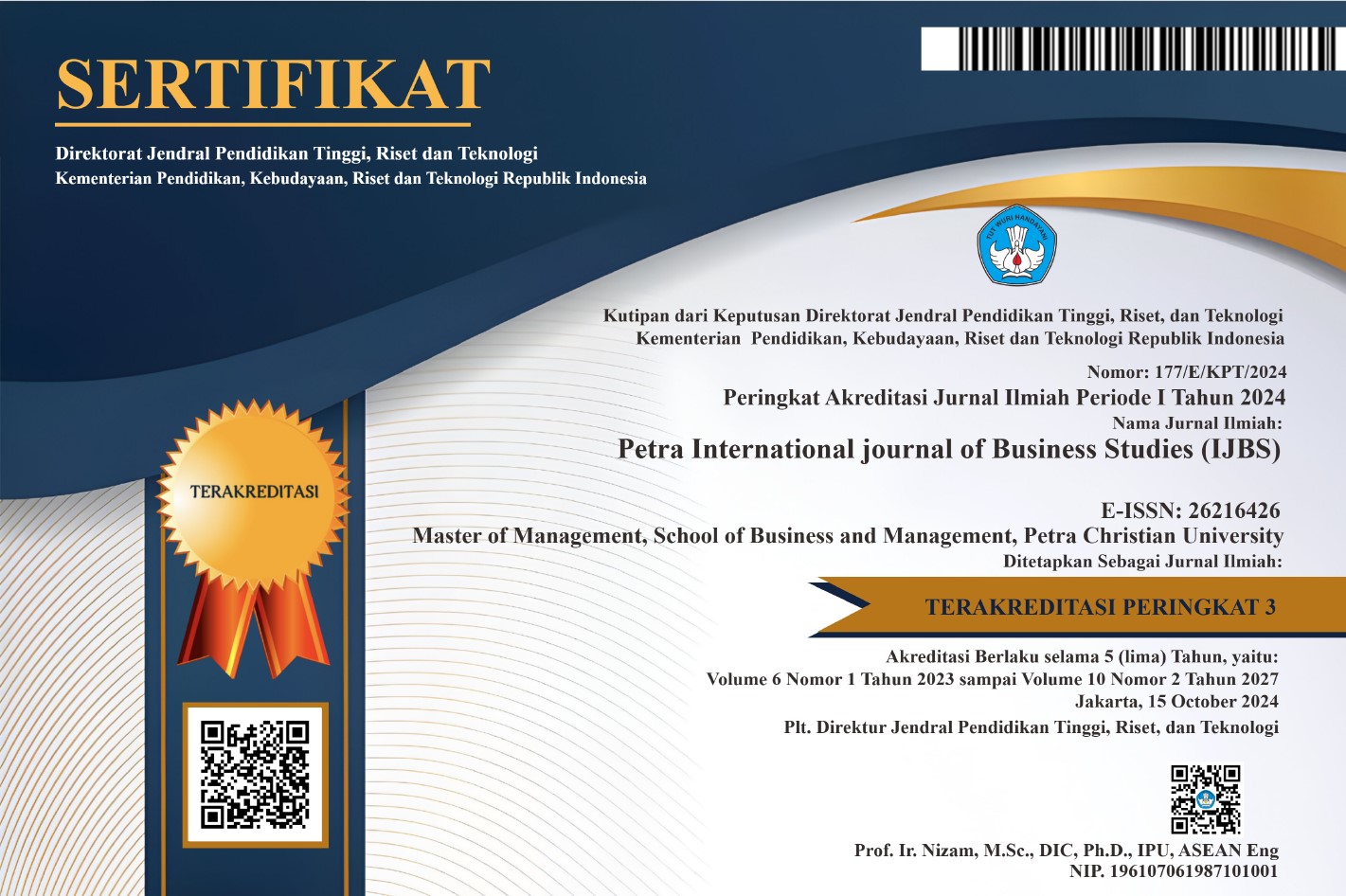Modeling Business Performance and Macroeconomic Factors to Explain Stock Market Returns in LQ45 Indonesia Stock Exchange (IDX)
DOI:
https://doi.org/10.9744/ijbs.2.1.36-43Keywords:
business performance; macroeconomic variables; political stability; stock return; LQ45Abstract
The purpose of this study is to confirm the effect of business performance and macroeconomics on stock returns in the industrial sector in the Indonesia Stock Exchange LQ45 index. This study examines eight variables from business performance and macroeconomics, namely: current ratio, debt-equity ratio, total asset turnover, return on equity, inflation rate, interest rate, exchange rate, and political stability to be tested for the effect on the stock return of the industrial sector. Using Generalized Least Square techniques, it is concluded that the Industrial sector in the Indonesia Stock Exchange is strongly influenced by macroeconomic factors rather than business performance factors. This is common in capital markets which are mostly dominated by foreigners because foreign investors are very sensitive to changes in a country's macroeconomic conditions especially if it is related to political conditions. From the iteration results, there are two multivariate regression models which are statistically considered the most suitable. The originality of this study is to prove statistically that political stability is very influential on LQ45 stock returns in the industrial sector on the Indonesia Stock Exchange
Downloads
References
Asmi, T. L. (2014). Current Ratio, Debt To Equity Ratio, Total Asset Turnover, Return On Asset, Price To Book Value Sebagai Faktor Penentu Return Saham. Management Analysis Jour¬nal, 3(2).
Asongu, S. A. (2012). Government quality determi-nants of stock market performance in African countries. Journal of African Business, 13(3), 183-199.
Boutchkova, M., Doshi, H., Durnev, A., & Mol-chanov, A. (2012). Precarious politics and return volatility. The Review of Financial Stu-dies, 25(4), 1111-1154.
Chambers, N., Sezgin, F. H., & Karaaslan, B. (2013). An Analysis of the Effects of Capital Structure and the Beta Coefficient on Stock Returns: A Case Study of the Istanbul Stock Exchange (ISE)-Manufacturing Industry. International Jour¬nal of Business and Social Science, 4(7).
Chau, F., Deesomsak, R., & Wang, J. (2014). Political uncertainty and stock market volatility in the Middle East and North African (MENA) coun-tries. Journal of International Financial Mar¬kets, Institutions and Money, 28, 1-19.
Djamil, A. B., Razafindrambinina, D., & Tandeans, C. (2013). The impact of intellectual capital on a firm's stock return: Evidence from Indone-sia. Journal of Business Studies Quarterly, 5(2), 176.
Erdogan, E. O., Erdogan, M., & Ömürbek, V. (2015). Evaluating the effects of various financial ratios on company financial performance: Application in Borsa Istanbul. Business and Economics Research Journal, 6(1), 35.
Estuari, A. (2010). Pengaruh Current Ratio (CR), Debt to Equity Ratio (DER), Return on Invest¬ment (ROI), Earning per Share (EPS) dan Divi¬dend Payout Ratio (DPR) terhadap return saham Perusahaan di Bursa Efek Indone¬sia (Doctoral dissertation, Diponegoro Univer¬sity).
Fahmi, I. (2017). Pengantar Pasar Modal Panduan bagi para Akademisi dan Praktisi Bisnis dalam Memahami Pasar Modal Indonesia. Bandung: Alfabeta.
Gujarati, D. N. (2009). Basic econometrics. Tata McGraw-Hill Education.
Hartono, J. (2016). Teori Portofolio dan Analisis Inves¬tasi. Yogyakarta: BPFE.
Kasman, S., Vardar, G., & Tunç, G. (2011). The impact of interest rate and exchange rate volatility on banks' stock returns and volatility: Evidence from Turkey. Economic Modelling, 28(3), 1328-1334.
Kasmir. (2012). Analisis Laporan Keuangan. Jakarta: PT Raja Grafindo Persada.
Kencana, M.R.K. (2018). 40 Persen Investor Asing Kuasai Transaksi Saham di Pasar Modal RI. https://www.liputan6.com/bisnis/read/3568672/40-persen-investor-asing-kuasai-transaksi-saham-di-pasar-modal-ri
Liu, L. X., Shu, H., & Wei, K. J. (2017). The impacts of political uncertainty on asset prices: Evidence from the Bo scandal in China. Journal of financial economics, 125(2), 286-310.
Maditinos, D. I., Šević, Ž., & Theriou, N. G. (2009). Modelling traditional accounting and modern value-based performance measures to explain stock market returns in the Athens Stock Exchange (ASE). Journal of Modelling in Management, 4(3), 182-201.
Mardiyati, U., & Rosalina, A. (2013). Analisis Peng-aruh Nilai Tukar, Tingkat Suku Bunga dan Inflasi Terhadap Indeks Harga Saham Studi Kasus Pada Perusahaan Properti yang terdaftar di Bursa Efek Indonesia. JRMSI-Jurnal Riset Manajemen Sains Indonesia, 4(1),1-15
Martani, D., Khairurizka, R., & Khairurizka, R. J. C. B. R. (2009). The effect of financial ratios, firm size, and cash flow from operating activities in the interim report to the stock return. Chinese Business Review, 8(6), 44-55.
Mishkin, F. S. (2015). The economics of money, banking, and financial markets. Pearson educa-tion.
Muhayatsyah, A. (2012). Pengaruh Kinerja Keuangan dan Makro Ekonomi Terhadap Return dan Beta
Saham Syari’ah pada Perusahaan yang Konsis¬ten di Jakarta Islamic Index. Jurnal Hukum Islam dan Ekonomi, 1(2), 1-28.
Nasir, A., & Mirza, A. (2011). Pengaruh Nilai Kurs, Inflasi, Suku Bunga Deposito dan Volume Perdagangan Saham Terhadap Return Saham Pada Perusahaan Perbankan yang Terdaftar di Bursa Efek Indonesia. Jurnal Ekonomi, 19(04).
Öztürk, H., & Karabulut, T. A. (2018). The Relation-ship between Earnings-to-Price, Current Ratio, Profit Margin and Return: An Empirical Ana¬lysis on Istanbul Stock Exchange. Accounting and Finance Research, 7(1), 109-115
Rahman, A. A., Sidek, N. Z. M., & Tafri, F. H. (2009). Macroeconomic determinants of Malay¬sian stock market. African Journal of Business Management, 3(3), 095-106.
Rjoub, H., Türsoy, T., & Günsel, N. (2009). The effects of macroeconomic factors on stock returns: Istanbul Stock Market. Studies in Economics and Finance, 26(1), 36-45.
Singh, T., Mehta, S., & Varsha, M. S. (2011). Macroeconomic factors and stock returns: Evidence from Taiwan. Journal of economics and international finance, 3(4), 217-227.
Subramanyam, K., & Wild, J. (2010). Financial Statement Analysis. McGraw Hill.
Suhandinata, J. (2013). Indonesian Chinese Descent In Indonesia's Economy And Political. Grame¬dia Pustaka Utama.
Tandelilin, E. (2017). Pasar Modal Manajemen Por¬to-folio & Investasi. Yogyakarta: PT Kanisius.
Tarazi, R. E., & Gallato, C. (2012). Determinants of expected stock returns: Evidence from the Malaysian and Thai Markets. Available at SSRN, 2167679.
www.bbvaresearch.com
www.bi.go.id
Additional Files
Published
Issue
Section
License
Petra IJBS (e-ISSN: 2621-6426) is published by Master of Management program, School of Business and Management, Petra Christian University, Indonesia (MM SBM PCU).












